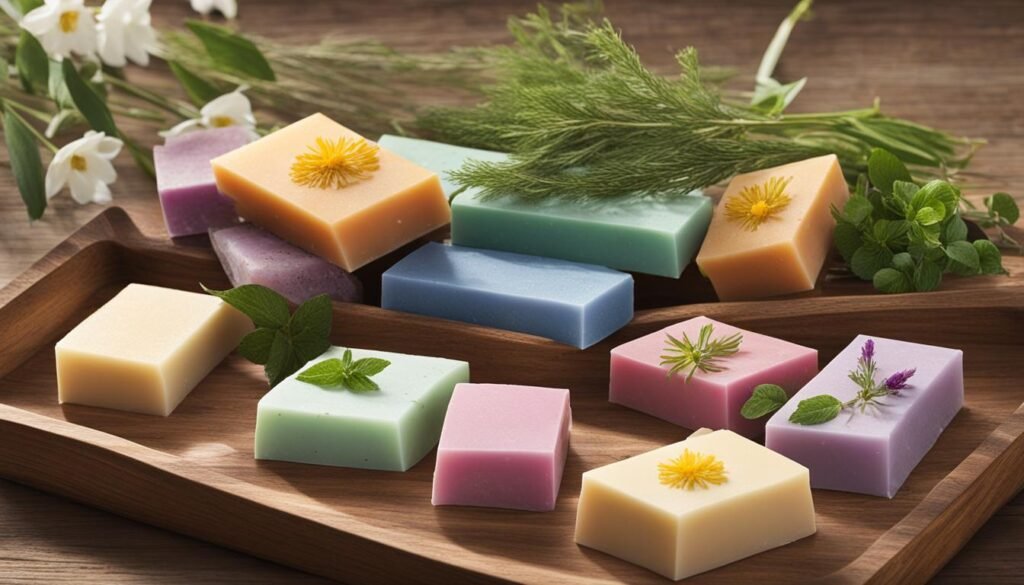Non-detergent soap is a game-changer in the world of cleaning products. Made from natural ingredients without any synthetic or chemical additives, it offers a gentle and effective alternative to traditional soaps. Whether you have sensitive skin or simply prefer natural products, non-detergent soap is worth exploring. Let’s dive into the benefits of using this wonderful creation.
Key Takeaways:
- Non-detergent soap is made from natural oils and fats, such as olive oil and coconut oil.
- It is gentle on the skin and suitable for those with sensitive skin or skin allergies.
- Non-detergent soap is environmentally friendly and biodegradable.
- Using non-detergent soap reduces the use of harsh chemicals and toxins in your everyday life.
- There are various brands and types of non-detergent soap available, such as castile soap, lye soap, Aleppo soap, and Marseille soap.
The Difference Between Detergent and Non-Detergent Soap
When it comes to choosing the right soap for your needs, it’s important to understand the key differences between detergent and non-detergent soap. Detergent soaps, commonly found in many commercial products, contain synthetic or chemical additives that can be harsh on the skin and the environment. In contrast, non-detergent soaps are made with natural ingredients, such as olive oil and coconut oil, which offer a gentle and effective cleansing experience.
One of the main advantages of non-detergent soap is its use of natural ingredients. These soaps are typically made with a combination of plant-based oils and fats, providing a nourishing and moisturizing effect on the skin. In contrast, detergent soaps often contain petroleum-based ingredients, which can strip the skin of its natural oils and cause dryness and irritation.
Furthermore, non-detergent soaps do not leave behind soap scum and react differently with hard water compared to detergent soaps. This means that non-detergent soaps are less likely to leave a residue on your skin or surfaces, resulting in a cleaner and more refreshing experience. Additionally, non-detergent soaps are often biodegradable and environmentally friendly, making them a great choice for those who prioritize sustainable and eco-friendly options.
The Benefits of Choosing Non-Detergent Soap
By opting for non-detergent soap, you can enjoy a range of benefits. Firstly, non-detergent soaps are gentle on the skin, making them suitable for individuals with sensitive skin or skin conditions. The natural ingredients in these soaps help to cleanse and nourish the skin without causing irritation or dryness.
Secondly, non-detergent soaps are non-toxic and safer for both your health and the environment. They do not contain harmful chemicals that can negatively impact your well-being or contribute to pollution. Instead, they offer a natural and sustainable alternative for everyday cleaning tasks.
In conclusion, the difference between detergent and non-detergent soap lies in their ingredients and their impact on your skin and the environment. By choosing non-detergent soap, you can enjoy the benefits of natural ingredients, gentle cleansing, and a more eco-friendly lifestyle.
Examples of Non-Detergent Soap
Non-detergent soap offers a natural and gentle alternative to traditional soaps that contain harsh chemicals. There are several examples of non-detergent soap available in the market, each with its own unique properties and benefits.
Castile Soap
Castile soap, made from olive or coconut oil, is a versatile soap that can be used for a variety of purposes. Its natural ingredients make it suitable for use as a body wash, shampoo, laundry soap, and even as a household cleaner. Castile soap is known for its gentle cleansing properties and is a popular choice among those with sensitive skin. Its versatility and eco-friendly nature make it a top choice for those looking to incorporate non-detergent soap into their daily routine.
Lye Soap
Lye soap, traditionally made with animal fat, can now be made with olive or coconut oil as well. It is known for its mild and gentle nature, making it ideal for individuals with sensitive skin or skin conditions. Lye soap is a time-tested option that has been used for generations and continues to be a popular choice today. Its simple yet effective formula makes it a reliable option for those seeking a natural and non-detergent soap.
Aleppo Soap and Marseille Soap
Aleppo soap and Marseille soap are two examples of non-detergent soaps with a rich history. Aleppo soap originates from Syria and is made with olive oil, laurel berry oil, lye, and water. It is known for its moisturizing properties and is suitable for all skin types. Marseille soap, originating from France, is made entirely from natural ingredients and typically contains a minimum of 72% vegetable oil, such as olive oil, coconut oil, or palm oil. Marseille soap is renowned for its gentle cleansing abilities and is often considered a luxury soap option.
These examples of non-detergent soap offer a wide range of options for individuals looking to switch to a more natural and gentle cleansing experience. Whether you choose castile soap, lye soap, Aleppo soap, or Marseille soap, you can feel confident in using a soap that is free from harsh chemicals and synthetic additives. Embrace the benefits of non-detergent soap and enjoy a cleaner, healthier, and more eco-friendly approach to personal care.
Benefits of Using Non-Detergent Soap
Using non-detergent soap offers a range of benefits that make it a popular choice for those seeking a more environmentally friendly and skin-friendly alternative to traditional detergent soaps. One of the key advantages of non-detergent soap is that it is biodegradable, meaning it breaks down naturally in a short period of time without polluting the soil or water. This makes it a sustainable choice that helps to minimize our impact on the environment.
Non-detergent soap is also gentle on the skin, making it ideal for individuals with sensitive or allergy-prone skin. Unlike detergent soaps that may contain harsh chemicals, non-detergent soap is typically made from natural ingredients such as olive oil or coconut oil. These oils help to moisturize and nourish the skin, leaving it feeling soft and hydrated.
Furthermore, non-detergent soap is non-toxic, which means it does not contain harmful chemicals that can be absorbed into the skin or cause irritation. This makes it safe to use for a variety of purposes, including handwashing dishes or recycling gray water for gardening purposes. By choosing non-detergent soap, you can ensure that you are using a product that is not only effective but also safe for you and the environment.

Explore the World of Non-Detergent Soap
These are just a few examples of popular non-detergent soap brands available in the market. From Dr. Bronner’s to Grandma’s, Zote to Fels-Naptha, these brands offer a wide range of options for individuals seeking natural and environmentally friendly cleaning solutions. Whether you’re looking for a gentle soap for sensitive skin or a powerful stain remover for your laundry, non-detergent soaps provide a safe and effective alternative to traditional detergent-based products.
So why not explore the world of non-detergent soap and discover the many benefits it has to offer? Not only will you be making a choice that is kinder to your skin, but also to the environment. Take a step towards a more sustainable and natural approach to cleaning with non-detergent soap.
Non-Detergent Soap for Plants
Non-detergent soap is not only beneficial for our bodies and the environment but can also be used to care for our plants. Unlike traditional detergent soaps that can harm plants, non-detergent soap provides a safer alternative.
Homemade insecticidal soap, made with a non-detergent soap dilution, is effective in cleaning plants without causing any harm. For a simple recipe, combine one cup of oil (such as olive oil or vegetable oil) with one tablespoon of non-detergent soap in a spray bottle filled with warm water. This homemade insecticidal soap can be sprayed on plants to combat pests, providing a natural and plant-friendly solution.
Using non-detergent soap for plants helps avoid the use of harmful chemicals, making it a healthier choice for both your plants and the environment. By opting for homemade insecticidal soap, you can have peace of mind knowing that your plants are being cared for with a gentle and effective solution.
Remember to rinse the plants thoroughly before consuming any harvestable items to ensure they are free from any residue. By utilizing non-detergent soap for your plants, you can maintain a healthy and vibrant garden while reducing the use of synthetic chemicals.
FAQ
What is non-detergent soap?
Non-detergent soap is a type of soap made from natural ingredients without any synthetic or chemical additives.
Is non-detergent soap better for sensitive skin?
Yes, non-detergent soap is a better choice for those with sensitive skin as it is made from natural oils and fats that are gentle on the skin.
Is non-detergent soap environmentally friendly?
Yes, non-detergent soap is environmentally friendly as it is biodegradable and non-toxic, making it safe for the environment.
What is the difference between detergent and non-detergent soap?
The main difference lies in their ingredients. Detergent soaps contain synthetic or chemical additives, while non-detergent soaps are made with natural ingredients.
What are some examples of non-detergent soap?
Some examples include castile soap, lye soap, Aleppo soap, and Marseille soap.
What are the benefits of using non-detergent soap?
Using non-detergent soap has several benefits, including being gentle on the skin, environmentally friendly, and non-toxic.
What are some popular non-detergent soap brands?
Dr. Bronner’s, Grandma’s Lye Soap, Zote, Fels-Naptha, and 20 Mule Team Borax are some popular non-detergent soap brands.
Can non-detergent soap be used for plants?
Yes, non-detergent soap can be used as a safer alternative to detergents for plants. Homemade insecticidal soap made with non-detergent soap can be used to clean plants without causing harm.

